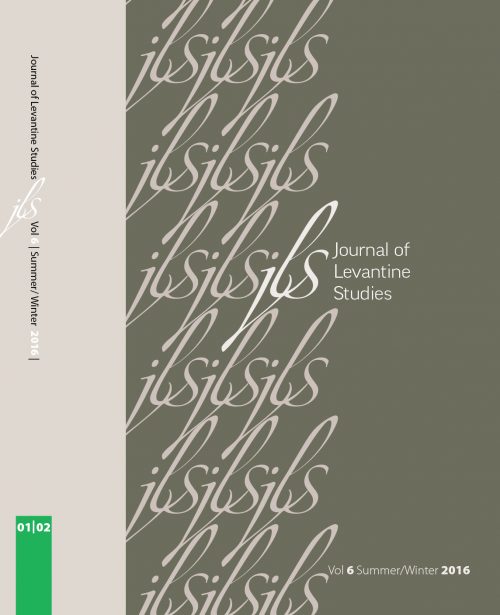-
Add to cartQuick view
Review Essay: Minorities and Majorities: The Nation-State and Identitarian Politics in the Modern Levant
Free!Kais M. Firro, Metamorphosis of the Nation (al-Umma): The Rise of Arabism and Minorities in Syria and Lebanon, 1850–1940. Brighton; Portland, OR: Sussex Academic Press, 2009. 201 pp.Benjamin Thomas White, The Emergence of Minorities in the Middle East: The Politics of Community in French Mandate Syria. Edinburgh: Edinburgh University Press, 2011. 239 pp.Add to cartQuick view -
 Add to cartQuick view
Add to cartQuick viewHasan and Marika: Screen Shots from a Vanishing Egypt
Free!This essay analyzes an Egyptian comedy film from the late 1950s as a window—one of the last cinematically—into the vanishing world of Egypt’s minority populations in the aftermath of the Suez Crisis and in the midst of nationalization and Egyptianization. Hasan and Marika (1959) focuses on one particular community, Egyptian Greeks. It borrows heavily from ethnic/religious minority tropes from the long-standing canon of Egyptian film and theater, in particular several classic works that deal with Muslim-Christian-Jewish pairings. It speaks to broader issues of what some scholars have noted to be a shifting or narrowing Levantine ethos. Concurrently, it raises questions about social and cultural transformations in the immediate postcolonial moment. This essay reads the film within the contexts of Egyptian social and cultural history, the position of the Greek community, ongoing limitations to true social integration, and historical questions about the Greek community’s demise. It also reads the film as a deliberate, if at times whimsical, commentary upon Egypt’s changing social landscape, comparing it to other works and later nostalgic depictions of Egypt’s lost multiculturalism.
Add to cartQuick view -
Add to cartQuick view
Manuel de Gama de Pádua’s Political Networks: Service, Subversion, and the Disruption of the Portuguese Inquisition
Free!Between 1674 and 1681, the activities of the Portuguese Inquisition were suspended by papal order. But how was it possible that this mighty institution, built by Catholic elites for religious and social discipline and political control, could be so comprehensively disrupted? This article argues that a key factor in motivating this break in Inquisitorial activity was New Christian political activism, and it seeks to explore what “politics” might have meant for such men, in a society that allowed this and other marginal groups no political role. It suggests that the financial and structural needs of the Crown, committed to empire building and pressured by a continuous war for survival during the Portuguese Restoration and subsequent war with Spain (1640–1668), brought a small group of entrepreneurs to the heart of the state. The article also explores the manner in which one member of this group used this influence for political ends. It seeks to offer new insights into this sort of political activity by viewing it from a cross-cultural perspective, rather than solely from a New Christian ethnic or religious standpoint. It will emphasize mechanisms of coexistence, trust, and cooperation and consider politics as not only an activity of the elites but also as something in which those who were repressed or marginalized engaged. This article forms a part of a wider study of early modern politics, trade, and religion viewed through the prism of the period during which the Portuguese Inquisition was suspended. I will explore the role of one entrepreneur living in Lisbon who was involved in the suspension. This man, Manuel da Gama de Pádua, used the skills, strategies, and connections he had gained in cross-cultural trade as a tool to bring about political change, acting as procurator, or legal representative, of the New Christian community.
Add to cartQuick view
- Home
- About JLS
- Issues
- Vol. 9 No. 1 | Summer 2019
- Vol 8 No 2 Winter 2018
- Vol. 8, No. 1: Summer 2018
- Vol. 7, No. 2: Winter 2017
- Vol. 7, 1: Summer 2017
- Vol. 6, Summer/Winter 2016
- Vol. 5, No. 2 Winter 2015
- Vol. 5, No. 1 Summer 2015
- Vol. 4, No. 2 Winter 2014
- Vol. 4, No. 1 Summer 2014
- Vol. 3, No. 2 Winter 2013
- Vol. 3, No. 1 Summer 2013
- Vol. 2, No. 2 Winter 2012
- Vol. 2, No. 1 Summer 2012
- Vol. 1, No. 2 Winter 2011
- Vol. 1, No. 1 Summer 2011
- Blog
- dock-uments
- Subscribe
- Submit
- Contact


